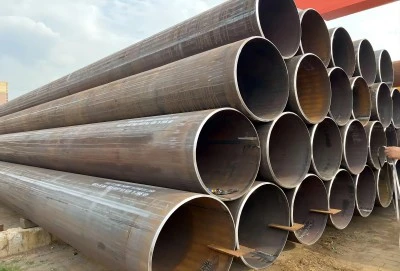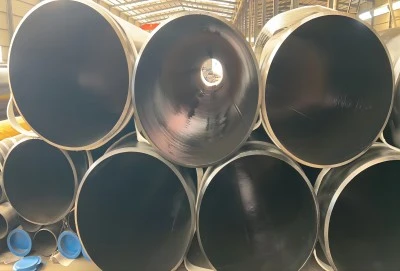Hollow section pipes are versatile structural elements widely used in various industries, including oil and gas transportation, water supply systems, bridge and building structures, offshore platform construction, and industrial manufacturing. These pipes come in three main types: Circular Hollow Sections (CHS), Rectangular Hollow Sections (RHS), and Square Hollow Sections (SHS). Each type offers unique characteristics and advantages, making them suitable for specific applications in large-scale engineering projects across the globe, particularly in the Middle East, Australia, and Southeast Asia.
|
|
|
Circular Hollow Sections (CHS)
Circular Hollow Sections (CHS) are cylindrical pipes with a hollow cross-section, offering excellent strength-to-weight ratios and uniform stress distribution. These characteristics make them ideal for various structural applications in the oil and gas industry, offshore platforms, and water supply systems.
CHS: Excellent weldability for structural applications
One of the key advantages of CHS is their exceptional weldability, which is crucial for structural applications in large-scale engineering projects. The smooth, rounded surface of CHS allows for easy and efficient welding, resulting in strong and durable connections. This feature is particularly beneficial in offshore platform construction and pipeline installations, where structural integrity is paramount.
The uniform stress distribution around the circumference of CHS makes them highly resistant to torsional forces, enhancing their performance in complex structural designs. Engineers and project managers often prefer CHS for columns, braces, and truss members due to their ability to withstand multidirectional loads effectively.
CHS: Ideal for low-temperature and chemical-resistant uses
CHS excel in low-temperature environments and applications requiring chemical resistance. Their circular shape minimizes stress concentration points, reducing the risk of material failure in extreme conditions. This makes them an excellent choice for cryogenic pipelines in LNG terminals and chemical processing plants.
The smooth interior surface of CHS also facilitates efficient fluid flow, making them ideal for water supply systems and oil and gas transportation. Their resistance to internal pressure and external corrosion further enhances their longevity and reliability in these applications.
CHS: Superior tensile strength and drift expansion
CHS boast superior tensile strength, allowing them to withstand high internal pressures and external loads. This property is particularly valuable in high-pressure pipeline systems and structural support elements in large-scale engineering projects. The ability of CHS to resist deformation under load ensures the long-term stability and safety of the structures they support.
Additionally, CHS offer excellent drift expansion capabilities, which is crucial in applications where thermal expansion and contraction are significant factors. This property makes them suitable for use in varying temperature conditions, such as those encountered in industrial manufacturing facilities and offshore platforms.
Rectangular Hollow Sections (RHS)
Rectangular Hollow Sections (RHS) are characterized by their elongated rectangular cross-section, offering a balance between strength and versatility. These hollow section pipes are widely used in construction, industrial manufacturing, and large-scale engineering projects due to their unique properties and ease of use.
RHS: Flat surfaces for easy joining in construction
One of the primary advantages of RHS is their flat surfaces, which provide excellent joining capabilities in construction projects. The flat sides allow for easy welding, bolting, and fastening, making them ideal for creating strong and stable connections in structural frameworks. This feature is particularly beneficial in bridge construction and building structures, where precise and secure joints are essential.
The flat surfaces of RHS also facilitate the attachment of additional components or cladding materials, enhancing their versatility in architectural and industrial applications. Project procurement managers often prefer RHS for their ease of integration with other building elements and their ability to create clean, modern aesthetics in exposed structural designs.
RHS: Lightweight yet strong for diverse industrial uses
Despite their robust nature, RHS maintain a relatively lightweight profile, making them an excellent choice for various industrial applications. Their high strength-to-weight ratio allows for efficient material use, reducing overall structural weight without compromising on load-bearing capacity. This property is particularly valuable in offshore platform construction and large-scale industrial manufacturing facilities, where weight considerations are crucial.
The combination of strength and lightness in RHS also contributes to easier handling and installation, potentially reducing project timelines and labor costs. Plant equipment managers appreciate the ease of transportation and manipulation of RHS in complex industrial settings.
RHS: High resistance to corrosion and stress cracking
RHS exhibit high resistance to corrosion and stress cracking, making them suitable for use in challenging environments. This property is especially important in oil and gas transportation systems, where exposure to corrosive substances and high-stress conditions is common. The resistance to corrosion ensures long-term durability and reduces maintenance requirements, leading to cost savings over the lifecycle of the project.
Moreover, the resistance to stress cracking enhances the reliability of RHS in applications subject to fluctuating loads or vibrations. This characteristic is particularly valuable in bridge structures and industrial machinery supports, where fatigue resistance is a critical factor in ensuring long-term structural integrity.
Square Hollow Sections (SHS)
Square Hollow Sections (SHS) are characterized by their equal-sided square cross-section, offering a perfect balance of strength, stability, and aesthetic appeal. These hollow section pipes are extensively used in building structures, mechanical applications, and various industrial settings due to their unique properties and versatile nature.
SHS: Versatile option for building and mechanical fields
SHS stand out as a versatile choice for both building and mechanical applications. Their square shape provides excellent stability and load-bearing capacity in multiple directions, making them ideal for columns, beams, and trusses in structural engineering projects. In the mechanical field, SHS are frequently used in machinery frames, conveyor systems, and support structures due to their ability to withstand complex loading conditions.
The uniform shape of SHS allows for easy connection and joint design, simplifying the construction process and reducing assembly time. This feature is particularly appreciated by project procurement managers and structural engineers working on large-scale projects with tight deadlines.
SHS: Uniform wall thickness with reinforced corners
One of the key advantages of SHS is their uniform wall thickness, which ensures consistent strength and performance across the entire section. This characteristic is crucial in applications where precise load distribution is required, such as in bridge supports or industrial equipment foundations. The uniform wall thickness also facilitates accurate stress calculations, enabling engineers to optimize material usage and structural design.
Additionally, the reinforced corners of SHS provide enhanced resistance to torsional forces and improve overall structural stability. This feature is particularly beneficial in applications subject to dynamic loads or in regions prone to seismic activity, offering increased safety and reliability.
SHS: Popular choice for exposed structural elements
SHS have gained popularity as a preferred option for exposed structural elements in modern architectural designs. Their clean, geometric shape contributes to a sleek and contemporary aesthetic, making them a favorite among architects and designers. The ability to combine form and function makes SHS an attractive choice for visible structural components in buildings, bridges, and industrial facilities.
Moreover, the smooth surfaces of SHS allow for easy application of protective coatings or decorative finishes, enhancing their corrosion resistance and visual appeal. This characteristic is particularly valuable in coastal or industrial environments where aesthetics and durability are equally important considerations.
Understanding the different types of hollow pipes is crucial for professionals in the oil and gas, construction, and industrial manufacturing sectors. Circular Hollow Sections (CHS), Rectangular Hollow Sections (RHS), and Square Hollow Sections (SHS) each offer unique advantages for specific applications. CHS excel in structural integrity and fluid transport, RHS provide versatility and ease of joining, while SHS offer stability and aesthetic appeal. By selecting the appropriate hollow section pipe for each project, engineers and project managers can optimize structural performance, cost-effectiveness, and longevity in their large-scale engineering endeavors across global markets.
Where to Buy Hollow Section Pipes?
When it comes to sourcing high-quality pipes for your projects, look no further than Hebei Longma Group. As a leading manufacturer in the industry, we offer a comprehensive range of hollow pipes, including CHS, RHS, and SHS, to meet diverse project requirements. Our state-of-the-art production facilities, coupled with our commitment to quality and innovation, ensure that you receive products that meet international standards and exceed your expectations.
At Hebei Longma Group, we pride ourselves on our advanced production equipment, which includes machinery imported from Germany and four independently developed production lines. Our professional team of over 300 employees, including more than 60 technical personnel, ensures the highest level of expertise in hollow section pipe manufacturing. We are equipped with comprehensive testing facilities, including online ultrasonic automatic flaw detectors and industrial X-ray television, to guarantee the quality and reliability of our products.
We understand the importance of timely project execution, which is why we offer fast delivery times, with the production of standard thickness steel pipes completed in as little as 7 days. Our products come with complete certifications, including API 5L, ISO 9001, ISO 14001, FPC, and Environmental Quality System certificates, ensuring compliance with international standards.
Our competitive pricing is made possible through long-term stable cooperation with raw material suppliers, mature production facilities, and a rigorous quality control system. We offer a wide range of hollow pipes, including grades S235, S275, and S355, with outer diameters ranging from 1/2" to 72" and thicknesses from SCH10 to SCH160. With stock quantities ranging from 50 to 150 tons, we are ready to meet your project needs efficiently.
For more information on our pipes or to discuss your specific project requirements, contact us at info@longma-group.com.














